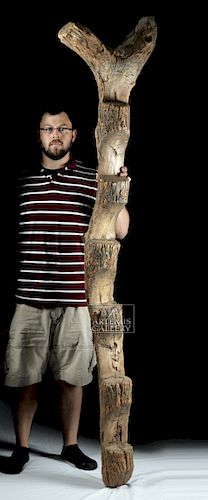Massive Early 20th C. African Dogon Wooden Ladder
Lot 165d
About Seller
Artemis Fine Arts
686 S Taylor Ave, Ste 106
Louisville, CO 80027
United States
Selling antiquities, ancient and ethnographic art online since 1993, Artemis Gallery specializes in Classical Antiquities (Egyptian, Greek, Roman, Near Eastern), Asian, Pre-Columbian, African / Tribal / Oceanographic art. Our extensive inventory includes pottery, stone, metal, wood, glass and textil...Read more
Estimate:
$4,500 - $6,750
Absentee vs Live bid
Two ways to bid:
- Leave a max absentee bid and the platform will bid on your behalf up to your maximum bid during the live auction.
- Bid live during the auction and your bids will be submitted real-time to the auctioneer.
Bid Increments
| Price | Bid Increment |
|---|---|
| $0 | $25 |
| $300 | $50 |
| $1,000 | $100 |
| $2,000 | $250 |
| $5,000 | $500 |
| $10,000 | $1,000 |
| $20,000 | $2,500 |
| $50,000 | $5,000 |
| $100,000 | $10,000 |
| $200,000 | $20,000 |
About Auction
By Artemis Fine Arts
Sep 5, 2019
Set Reminder
2019-09-05 10:00:00
2019-09-05 10:00:00
America/New_York
Bidsquare
Bidsquare : Ancient / Ethnographic From Around The World
https://www.bidsquare.com/auctions/artemis-gallery/ancient-ethnographic-from-around-the-world-4405
Variety galore! Featuring ancient art from Egypt, Greece, Italy and the Near East, as well as Asian, Fossils, Pre-Columbian, Native American, African / Tribal / Oceanic, Spanish Colonial, Russian Icons, Fine art, much more! All categories, all price ranges... Artemis Fine Arts info@artemisgallery.com
Variety galore! Featuring ancient art from Egypt, Greece, Italy and the Near East, as well as Asian, Fossils, Pre-Columbian, Native American, African / Tribal / Oceanic, Spanish Colonial, Russian Icons, Fine art, much more! All categories, all price ranges... Artemis Fine Arts info@artemisgallery.com
- Lot Description
West Africa, Mali, Dogon, ca. first half of the 20th century CE. An enormous ladder carved by hand from the trunk of a hard wood tree. The ladder has a slender base, six large steps carved into the obverse side, and a forked top portion. The midsection of the ladder is curved slightly outwards and the backs of both forked prongs are worn, both signs of repeated use. The Dogon peoples typically built their homes into the sides of sandstone cliffs, though they could be free-standing structures as well. Dwellings with flat roofs usually have large holes in the center, and families would climb ladders like this example to sleep in the cool night air when the weather permitted. Dogon peoples also used large wooden ladders to access upper storage areas in granaries. While not regularly used in modern times, ladders like this are still cherished possessions prized for their sturdy craftsmanship and lustrous surface patina. Size: 19.75" W x 86.5" H (50.2 cm x 219.7 cm).
For a stylistically-similar example, please see the Museum of Fine Arts, Houston, accession number 98.239: https://www.mfah.org/art/detail/33023?returnUrl=%2Fart%2Fsearch%3Fartist%3DDogon%2Bpeoples
Provenance: private East Coast, USA collection; ex-Merton Simpson collection, New York, USA, acquired in the 1980s
All items legal to buy/sell under U.S. Statute covering cultural patrimony Code 2600, CHAPTER 14, and are guaranteed to be as described or your money back.
A Certificate of Authenticity will accompany all winning bids.
We ship worldwide and handle all shipping in-house for your convenience.
#139228Surface wear and abrasions commensurate with age and use, small losses to several steps and areas of forked prongs, multiple stable pressure fissures, and some splintering. Nice earthen deposits and wonderful lustrous patina throughout.Condition
- Shipping Info
-
All shipping is handled in-house for your convenience. Your invoice from Artemis Gallery will include shipping calculation instructions. If in doubt, please inquire BEFORE bidding for estimated shipping costs for individual items.
-
- Buyer's Premium



 EUR
EUR CAD
CAD AUD
AUD GBP
GBP MXN
MXN HKD
HKD CNY
CNY MYR
MYR SEK
SEK SGD
SGD CHF
CHF THB
THB













